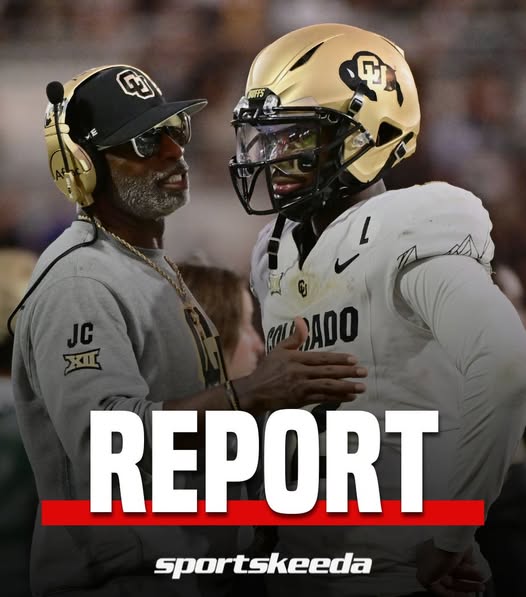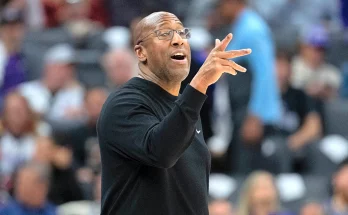Warren Moon isn’t just a Hall of Fame quarterback. He’s a pioneer. A barrier-breaker. A man whose journey to the NFL required not only talent, but dignity, poise, and a deeply-rooted sense of humility. So when he speaks about the quarterback position, particularly about how it should be played—and how its leaders should carry themselves—it commands attention. And now, that attention is squarely focused on Colorado quarterback Shedeur Sanders.
During a recent interview, Moon offered pointed but thoughtful remarks about Sanders’ approach, suggesting the young star still has a lot to learn about what it truly means to lead from under center. Specifically, Moon took issue with Sanders’ swagger, noting that it more closely resembles that of a flashy cornerback than a quarterback—an archetype he views as fundamentally different.
“You can’t act like a cornerback when you’re playing quarterback,” Moon said. “Quarterback is a humble position. You’ve got to be respectful… that’s what he has to understand.”
It wasn’t a hit piece. It wasn’t malicious. But it was real—and loaded with the kind of layered wisdom that comes from decades of playing the game at its highest level. For Moon, quarterbacking is about more than touchdowns and NIL deals. It’s about leadership. And if Sanders wants to fulfill his immense potential, the Oilers legend believes he must embrace that role with a different kind of mindset.
Sanders, the son of Pro Football Hall of Famer Deion Sanders and a rising star in college football, has never been short on confidence. That much is clear. Whether it’s showing off designer watches during games or chirping at opponents, Sanders brings a level of bravado to the field that’s rare for a quarterback—especially one who’s still in college. To some, it’s refreshing. To others, it’s a red flag.
Moon seems to fall somewhere in the middle. He acknowledges the talent. He sees the upside. But he also sees a young man whose style may be clashing with the responsibilities of his position. And while Moon isn’t demanding Sanders lose all his personality, he is urging him to reassess how he presents himself as the face of a program—and a possible face of an NFL franchise.
“I like his game,” Moon said. “He throws the ball well, he’s got good mechanics, he’s accurate, and he’s tough. But there’s a certain way you have to carry yourself at quarterback. You’re the leader. You’re the tone-setter. You’re the guy everyone’s looking to when things get tough.”
That might be where Moon’s concerns are rooted. In his view, the quarterback must lead not just with talent, but with temperament. While cornerbacks are often encouraged to play with flair, emotion, and even antagonism, quarterbacks must exhibit restraint, composure, and a quiet sense of authority.
That contrast—between flash and humility—is what Moon appears to be highlighting. And it’s not a new perspective. For decades, football traditionalists have lauded quarterbacks who carried themselves with stoic calm, even in the most chaotic situations. Think Tom Brady. Think Joe Montana. Think Moon himself.
Of course, the game has changed. The modern college football and NFL landscape are more entertainment-driven than ever before. Social media plays a major role in how athletes build their brand. NIL has allowed players like Sanders to earn millions before even declaring for the draft. In that environment, humility can feel like a lost art.
And yet, Moon insists it still matters—especially for quarterbacks.
“There’s nothing wrong with confidence,” Moon said. “But it has to come with a level of maturity and understanding. You can’t alienate teammates. You can’t make it all about you. And you certainly can’t put yourself above the team.”
It’s fair to wonder whether Sanders has crossed that line. His father, Coach Prime, certainly doesn’t discourage individuality or swagger—he thrives on it. The entire Colorado program has become a reflection of Deion’s personality: bold, loud, unapologetic. But when the cameras are off and the grind begins, Moon believes that true leaders distinguish themselves not with bling, but with humility.
Moon isn’t the only former quarterback voicing concerns. Several analysts and ex-NFL players have recently questioned whether Sanders’ on-field demeanor and public persona could hurt his draft stock. While most scouts agree that he has NFL-caliber tools, there’s an increasing chorus of voices wondering whether he has NFL-caliber maturity.
That’s not to say Sanders is immature. But perception matters. And as Moon alluded to, NFL front offices take leadership traits very seriously. They want quarterbacks who can command a locker room, navigate adversity, and inspire teammates. All of that begins with humility.
It’s easy to forget that Moon himself was once a young quarterback with something to prove. After going undrafted in 1978 despite a stellar college career at Washington, Moon headed to the CFL, where he won five Grey Cups with the Edmonton Eskimos before finally getting his shot in the NFL with the Houston Oilers in 1984. From there, he became the first Black quarterback inducted into the Pro Football Hall of Fame.
But Moon’s path wasn’t just about stats. It was about character. Poise. Patience. He had to stay composed even when the league didn’t believe in him—especially when the league didn’t believe in him. And because of that, he believes quarterbacks today owe it to the position—and to themselves—to walk that same line.
“Shedeur has all the tools,” Moon said. “He could be great. But you can’t forget what comes with playing quarterback. It’s a position that demands more from you. Not just on the field, but off it.”
That’s the essence of Moon’s message. He’s not tearing Sanders down. He’s reminding him of the responsibility he carries—not just as a quarterback, but as a high-profile young Black quarterback with a massive following. In today’s college football landscape, Sanders isn’t just representing himself or his school. He’s shaping perceptions for the next generation.
And with that kind of platform, Moon believes the stakes are even higher.
“When you’re in that position,” Moon said, “you’re not just playing football. You’re leading. You’re setting an example. You’re someone a lot of people are looking up to, whether you like it or not.”
That may be the final piece of Moon’s critique: that the position of quarterback requires not only performance, but self-awareness. Not just the ability to make plays, but the wisdom to know when to let your play speak for itself.
For Sanders, who is expected to be one of the top quarterbacks in the 2025 NFL Draft class, these words should resonate. His skill is undeniable. His ceiling is immense. But greatness at quarterback has always been about more than arm strength. It’s about how you carry yourself when the spotlight is brightest—and when the noise is loudest.
Moon knows that pressure well. He’s lived it. And in a way, his comments to Sanders were less a rebuke than a gift: a nudge from someone who’s walked the hardest path and made it out on the other side as a legend. It’s a lesson in grace. In self-discipline. In understanding the full scope of what the position demands.
Because in football—and in life—being great often starts with being grounded.
For Shedeur Sanders, that may be the next step.


